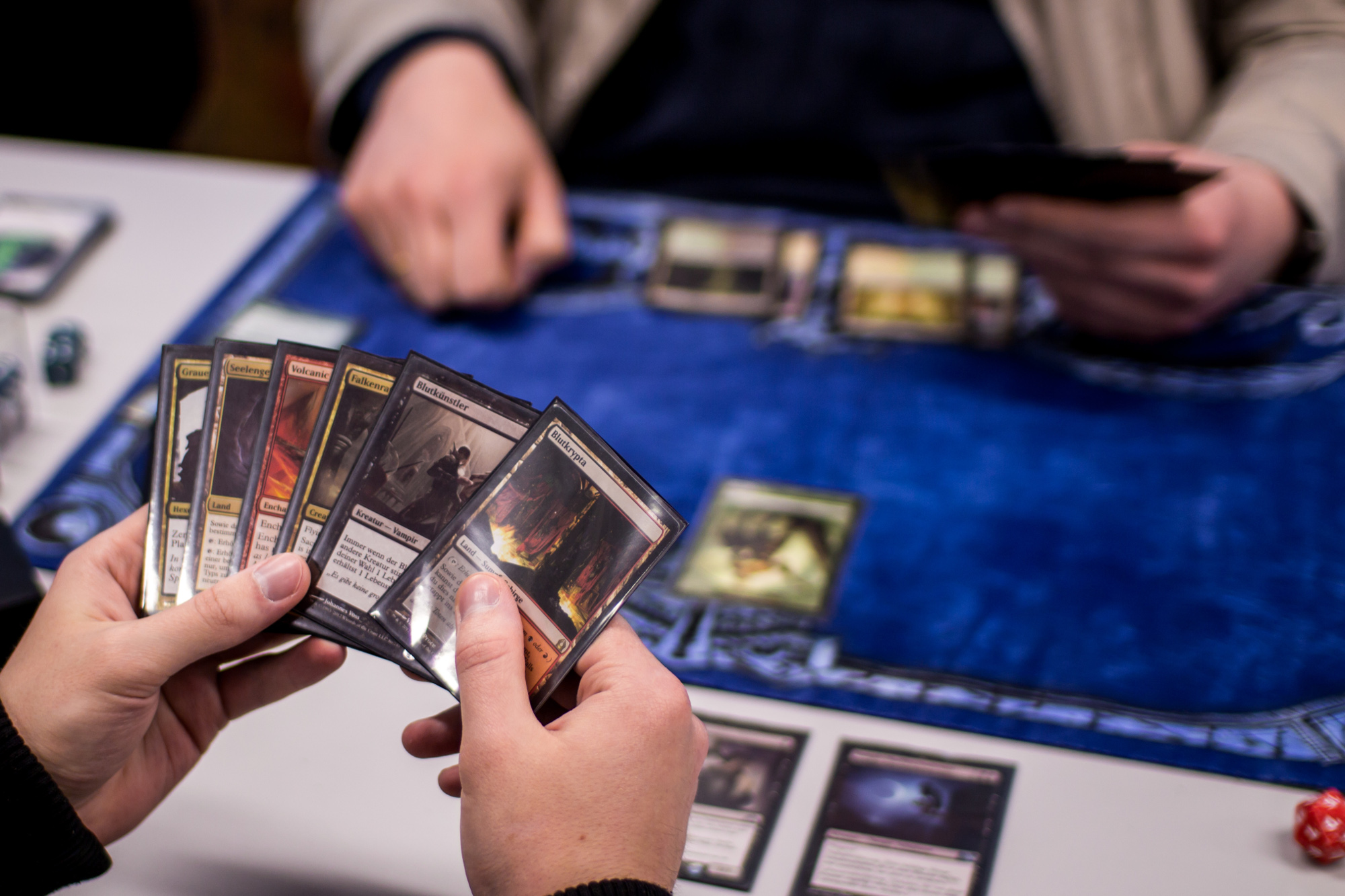Conclusions

The game of Magic continues to develop with new releases, new cards, new mechanics, and new worlds. Wizards of the Coast has continually experimented with new approaches to the game, from adding new mechanics, removing unpopular or unhelpful mechanics (e.g., those that might considerably slow down gameplay), and responding to player feedback in timely and, often, public forums. This attention to experimentation allows Wizards of the Coast to maintain and grow interest in the various modes of game play, from Standard to Legacy to Commander. For example, Ovalchase Dragster from the Kaladesh/Aether Revolt block involves a vehicle artifact type that can temporarily function like a creature, and thus engage in combat, when another creature card (with certain power threshholds) is tapped to serve as the vehicle’s crew (for more on the vehicle mechanic and the rationale behind its development, see Gavin Verhey, 2016). This sort of mechanism works in the artifact-focused decks in the block, which takes place diegetically during an inventor’s fair and a rebellion against a totalitarian government with strict control over magical resources and artifact development.
Importantly, the development of rules and the emergence of protocols for dealing with points of tension keeps rhetorical potential emphasized during the playing of Magic. As Bruno Dias (2017) noted regarding the simultaneously confusing and exciting nature of complicated Magic mechanics interactions and the protocols that inform how they are resolved:
Magic will happily let you have Opalescence and Humility—two enchantments that read "every enchantment is a creature with power equal to its mana cost" and "every creature has 1 power"—next to each other on the table. I can look up judge rulings online to see what happens under those circumstances, but it would take about an hour to explain why. Any sane designer would call this a problem, a rough edge, an unfortunate artifact of Magic’s age, complexity, and less-than-rigorous rules in its earlier days. But I can’t help loving it; Magic contains genuine mysteries, in the original, religious sense of the word. People had to sit down, presumably in a conference room in Renton, WA, and figure out how Opalescence and Humility interact. Maybe several times over the years, as the rules get readjusted. To me, that’s perversely fascinating. [card links added]
The possibilities for such interactions to occur cannot always be anticipated, but how they operate (e.g., which card’s rules get priority or how players can determine that) and how they come to be understood to operate are inherently rhetorical activities. By attending to these sorts of tensions and the opportunities for inquiry that they create, we can better understand not only how to involve ourselves successfully in complex protocological systems but also how to articulate such involvement so that others, too, can navigate similarly complex systems.
In the end, more research into analog games is needed as a necessary complement to the burgeoning focus on protocological and procedural rhetorics in digital games. Furthermore, we can see by looking at analog games that protocols and exploits are not merely the product of new technological developments, but modes of persuasion and meaning-making that have always been at work in rhetoric. What is particularly exciting about drawing attention to analog systems now via procedural rhetoric is that the excellent work that has been done in regards to the rhetorical study of digital situations may grow that much more valuable beyond their initial scope.
Frankly, our call for further research into analog games as objects of study for procedural rhetoric could (and perhaps should) be expanded to diverse kinds of analog systems; while important and illuminating work has been done on games as particularly productive objects of study for digital/procedural rhetoric, we should also attend more closely to those complex networks and systems that address unfamiliar subjects and tensions and that function in unexpected ways, ways that are not easily comparable to games of any recognizable sort.
Similarly, whether the constraints of proprietary and class in Greece and Rome, laws about blasphemy and heresy in the Middle Ages, or contemporary concerns about (or resistances to) identity politics and race relations, we can see that persuasion has never been simply direct, but always founded in rhetorically oriented protocol. That is, while rhetors may have been casting persuasion on their summoned audiences, blasting interlocutors with verbal fireballs or rumors draining the life from effective refutations, there has always been protocological rhetoric. In sum, while we might have been playing the game of rhetoric for millennia, it too has been playing us.